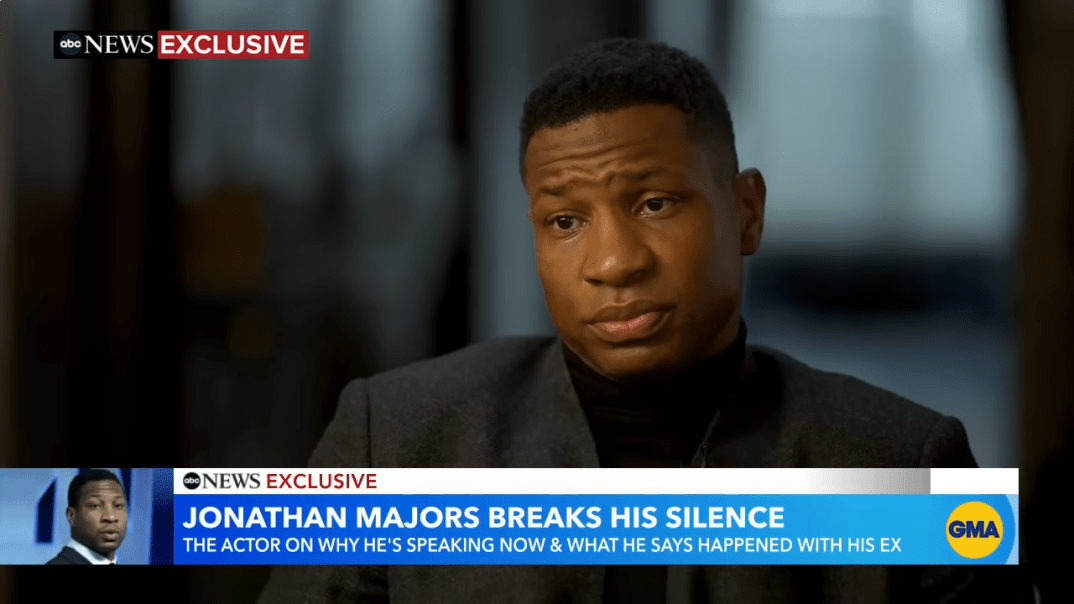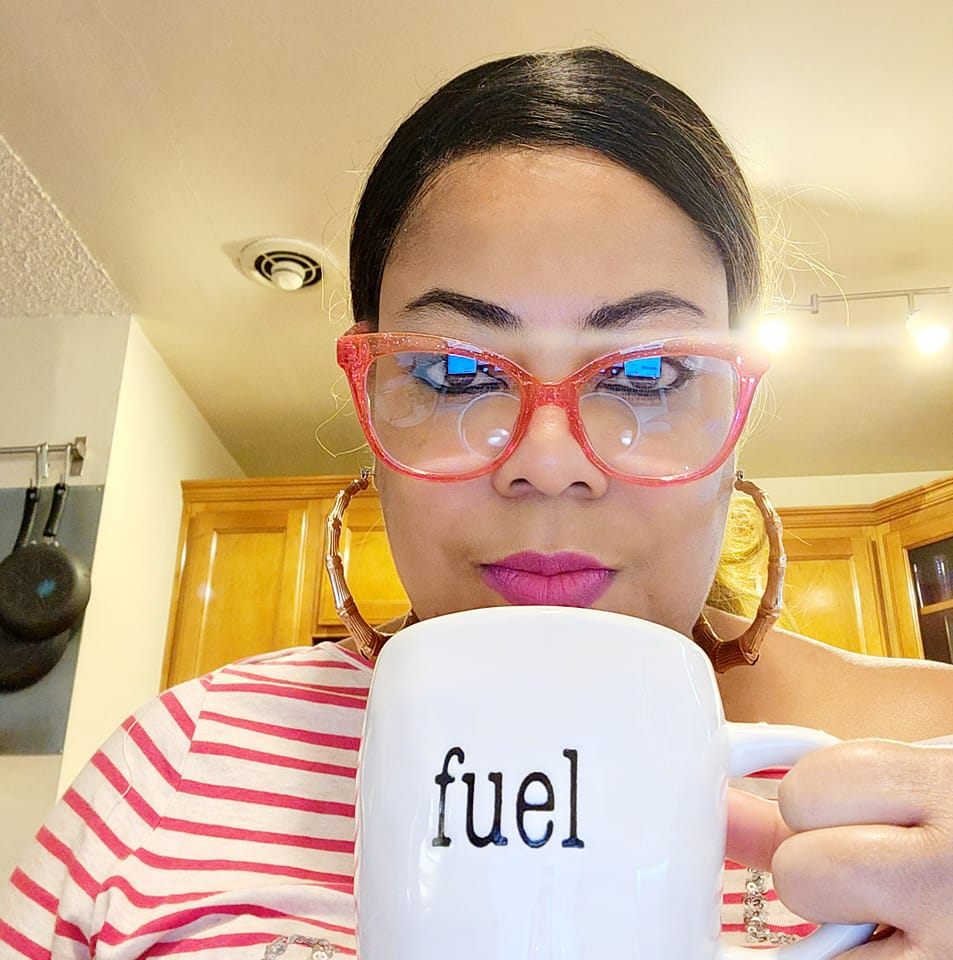Black women can’t save you, Jonathan Majors
OPINION: Even after being convicted of reckless assault and harassment, the former ‘heartthrob’ continued to play the victim in his "Good Morning America" interview.

Editor’s note: The following article is an op-ed, and the views expressed are the author’s own. Read more opinions on theGrio.
Someone on Jonathan Majors’ team doesn’t like him very much.
That’s the only explanation I can come up with for why they have repeatedly allowed him to make himself look guilty and look like a fool for the last nine-and-a-half months as he has been arrested, charged, tried and convicted of assaulting his former girlfriend, Grace Jabbari.
I don’t think we have ever witnessed a “grand opening; grand closing” moment happen as swiftly as it did for Majors when news of his arrest for the incident hit the news in March of last year. He went from being the timeline’s most wanted to the timeline’s most hated so quickly, I’m sure even his head spun.
As the story goes, Majors and Jabbari were riding in a car together when he received a text message from another woman that read “Wish I was kissing you right now.” According to court documents, Jabbari grabbed the phone from Majors in an attempt to see who sent him the text. Prosecutors say Majors grabbed Jabbari’s right side of her body and pried her right finger off the phone, which resulted in injuries to her finger. He is also said to have twisted her right arm and struck her ear.
After taking his phone from Jabbari, Majors got out of the vehicle they were riding in, and when she attempted to follow him, Majors picked her up and “threw” her back inside the car.
Jabbari’s injuries that night included a “fractured finger, bruising about her body, a laceration behind her right ear, and a bump on her head.”
Everything that has come from him and his camp since that night has been a complete and total mess. Let’s examine some of the ways Jonathan Majors has screwed the pooch on this one and really shown himself to be a narcissist and an unlikeable human being.
DARVO is not the flex you think it is.
Since day one, Majors and his team have done everything in their power to paint Jabbari as the real aggressor in this particular situation. They have tried to paint Majors as the victim of an unfortunate set of circumstances instead of someone who put his hands on another person, causing them injury.
DARVO is a tactic abusers use when they are caught red-handed being abusive. Instead of taking responsibility for their actions, they deny them, attack their victim, and shift the blame so the victim becomes the villain in the story.
DARVO has been the book from which Majors and his team have drawn all their plays since this incident first came to light.
Majors was convicted of misdemeanor reckless assault and harassment of Jabarri on Dec. 19, and he is still playing the victim.
Recommended Stories
In an interview aired Monday on “Good Morning America,” the actor wiped away tears no one could see and said, “This has been very, very hard and very difficult and confusing in many ways,” in a shaking voice.
“I’m sorry,” he said, wiping away his invisible tears and sniffling a bit. “I haven’t seen my daughter in a long time, you know? A lot of it has to do with this situation.”
It is here that I will remind you that this man is an actor and a graduate of Yale School of Drama, so you will forgive me if I find myself unmoved by his pitiful performance.
A misdemeanor reckless assault conviction means the jury recognizes that Majors may not have intended to cause injury to Jabbari, but his actions did result in injury to her.
It’s the easiest out of convictions in this case, and even with that light tap on this wrist, this big-ass negro couldn’t find it within himself to own up to what he did.
“GMA’s” Linsey Davis said to Majors, “They’re saying you didn’t intend to injure her, but the result of your recklessness injured her.”
“Right,” Majors agreed.
“Were you reckless?” Davis asked.
“I was reckless with her heart,” Majors replied.
“Not with her body?” Davis countered.
“Not with her body,” Majors responded.
Boy, if you don’t get the entire …
He couldn’t (or wouldn’t) even say he may have hurt her accidentally.
Throughout the interview, Majors made comments that painted Jabbari in an unfavorable light and made her seem unstable, and he even told Davis that he should have left the relationship.
“I loved Grace,” he said. “Our relationship was not healthy, and that began to reveal itself over time.”
“Why’d you stay?” Davis asked.
“I was scared,” he replied.
Scared of what? Was she holding you hostage? Did she have goons threatening you about what would happen if you did leave her? Should we ignore the evidence that was presented during the trial, including recordings that showed you being narcissistic and abusive?
Instead of owning up to his actions, Majors continued to tell Davis that he should have been “brave” enough to leave a relationship he described as “dangerous.”
I’m left wondering, dangerous for whom?
Black women are not your props.
Grace Jabbari had recordings of conversations they had privately in their home. During one such conversation, Majors told Jabbari that he was a “great man” doing “great things,” and he needed a woman to stand by his side the way Coretta Scott King did for MLK or the way Michelle Obama did for Barack.
When those recordings were released, my first thought (and the first thought of a lot of others around the internet as well) was why would you be asking this of a white woman?
My second thought was wondering how this dude is comparing himself to Barack Obama and MLK, two historical changemakers.
Let’s first look at the way he has whittled the identities of Coretta and Michelle down to being the wives of powerful Black men.
It’s egregious in and of itself considering both of these women have numerous accomplishments and things they have done on their own outside of their notable husbands.
Michelle LaVaughn Robinson Obama is a Princeton graduate with a Harvard Law degree. She was the attorney assigned to mentor Barack Obama when he was a summer associate at Sidley and Austin.
She is her own person.
Similarly, Coretta Scott King is more than the wife of MLK. She was educated and a singer, and she met Martin while doing graduate work in music at the New England Conservatory of Music.
Yes, she stood by her husband’s side throughout all his work during the Civil Rights Movement, but even after his death, she continued to work to make the world a better place — taking a stand against apartheid, fighting for LGBT rights, and establishing the King Center. She was an active advocate for world peace.
Neither Coretta nor Michelle were simple arm-pieces for their husbands, but that is the way Majors has characterized them through his words.
Even Bernice King had to come out and speak in her mother’s defense after Majors once again invoked Coretta’s name during his “GMA” interview.
“My mother wasn’t a prop,” King wrote on Twitter late Tuesday afternoon. “She was a peace advocate before she met my father and was instrumental in him speaking out against the Vietnam War. Please understand…my mama was a force.”
Please leave Meagan Good alone.
When Majors invoked Coretta Scott King during his “GMA” interview, he was doing so in reference to his “relationship” with actress Meagan Good.
“She’s an angel. She’s held me down like a Coretta,” Majors said of Good.
I don’t know how or why Meagan Good got involved with this man, but I want her away from him as soon as possible, and I know I am not the only one who feels this way.
Let me first point out that all of the relationships we have seen Majors in publicly have been with non-Black women. He seemingly didn’t have a desire for Black women until he got in trouble, and then he found one who is beloved by the Black community and chose her to hide behind.
Meagan, if you need our help, please blink twice.
The Black delegation loves Meagan Good. She has been a figure in Black movies and television shows since she played one of the children standing in front of Big Worm’s ice cream truck in “Friday.”
Watching her get dragged into this situation is already alarming, but seeing Majors objectifying her as his Black woman prop makes it that much worse.
It’s giving she is a stepping stone on his path to “redemption.”
Black women are not your hiding place when you get in trouble.
Black women are not your safe space when the white gaze you sought for so long turns into an angry white glare.
Black women are not your props to use to try and redeem yourself after your fall from, well, Grace.
Jonathan Majors needs to have a seat. He needs to go somewhere, sit down, be quiet and reflect on how his actions have gotten him to this point.
He went from celebrity crush to celebrity mush in a matter of months, and instead of wrestling with that on his own, doing the work and coming out of it a better person, he has taken the narcissistic path of least resistance where everything is secondary to him and his needs.
What we have come to learn is all the charm is an act. The tears on “GMA” are an act. The entire “gentle giant” persona is an act.
Jonathan Majors is not a “great man” doing “great things.”
He’s a flawed man who hasn’t done the work to reach the accountability stage of the program, and until he gets that right, he’s going to continue to assist in his own downfall.
And no Corettas, Michelles or Meagans are going to be able to save him from that.

Monique Judge is a storyteller, content creator and writer living in Los Angeles. She is a word nerd who is a fan of the Oxford comma, spends way too much time on Twitter, and has more graphic t-shirts than you. Follow her on Twitter @thejournalista or check her out at moniquejudge.com.
Never miss a beat: Get our daily stories straight to your inbox with theGrio’s newsletter.








